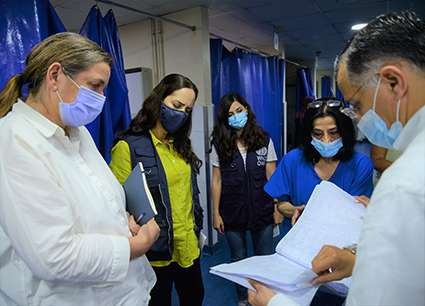
29 June 2021 – WHO Lebanon Representative Dr Iman Shankiti, accompanied by Esmée De Jong, Head of European Civil Protection and Humanitarian Aid Operations (ECHO) Beirut, and a team from the WHO country office in Lebanon visited Tripoli Governmental Hospital for a field visit to discuss current challenges and gain insight on the impact of the crisis on the public health sector. They met with the hospital team headed by its Director Dr Naser Adra, and Head of the Board Dr Hallak Fawaz.
The main challenges faced by the 220-bed hospital were an increase in incurred expenses as a result of price hikes (such as the 17 fold increase in the cost of sterile gloves or the 8 fold increase in cost for blood bags), devaluation of the lira, shortages and/or lack of supplies in local markets, migration of doctors and nurses (15), and the increased patient case load during the last few months. Medical Director Dr Helmi Chamroukh stated that the health work force in general had been hit hard as a result of the current financial crisis and the devaluation of the currency, and most recently, the shortage in fuel which affect the commute of health workers to and from the hospital.
Nursing Director Roula el Hajj reported a shortage in human resources for health to cover the care of all patients in the hospital, especially that the hospital has been witnessing a consistent increase in the number of patients since the beginning of the year. Although the hospital director confirmed that they did not turn away any critical patients, he emphasized the alarming financial crisis they are facing. Meanwhile, the hospital pharmacist Dr Rania Soltan expressed deep concern over the shortage in medication and increased market prices – some have increased by 400%, which will have a direct impact on availability and affordability of medication.
The team also visited Iman primary health care (PHC) centre to meet the Director Jihad Fahmi and his team for updates on current PHC operations. As is the case in the hospital devaluation of the lira and increased market prices for medical supplies and medication is affecting their daily operations, including the ability to conduct maintenance and/or replace defected equipment, availability of fuel and the ability to cater for the 40% increase in number of registered chronic illness patients in the centre.







